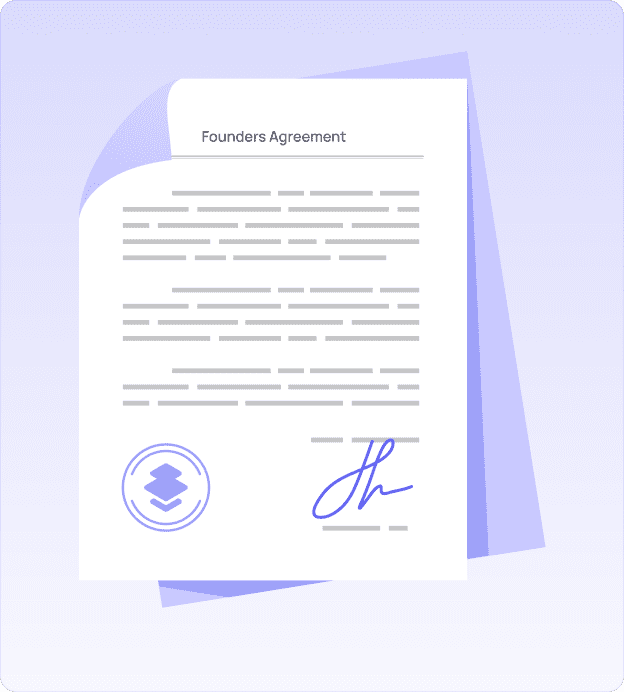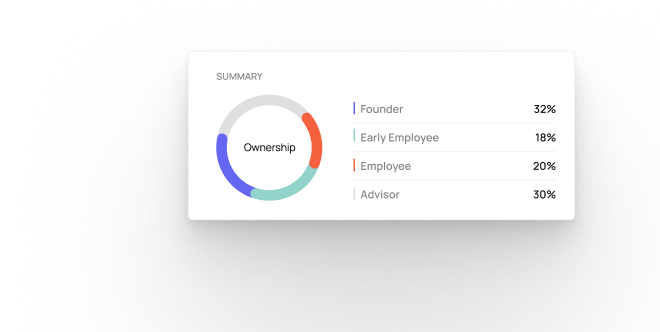Founders Agreement Template
A simple agreement to get you from idea to formation.

What is a Founders Agreement?
A Founders Agreement (also known as a Co-Founder Agreement or Pre-Incorporation Agreement) is a contract among two or more founders that lays out the terms of their collaboration in regards to the startup project they’re working on or want to work on.
Think of it as the blueprint of the future company the founders are going to build together. Who’s bringing what to the table – who’s going to write the code, who’s going to do the sales, recruit the team, etc? Who’s getting how much stock, and is it subject to vesting? Is anybody investing cash? What happens to the intellectual property that is being created? What if things don’t work out?
Who needs a Founders Agreement?
If you’re working with one or more co-founders on a startup project and you haven’t yet incorporated your company (or have just incorporated it), then a Founders Agreement is for you.
If your company has been around for a while now, a Founders Agreement may not be so useful to you.
If you’re a solo founder, you don’t need a Founders Agreement.
How to use this Founders Agreement template?
We’ve created this template as a Google Doc file with guiding comments. You can download the file or create a copy for your own Google Drive. Then, go through each of the comments or bracketed text (in red) and fill in the blanks. Once all the blanks are filled in, all the founders should sign the Founders Agreement. You can do this via e-signature (such as Docusign) or print, sign, and scan for your records.
Of course, keep in mind that templates are just starting points and should not be taken as legal advice. If you have any questions, it’s best to check in with a competent lawyer.
Why should I trust this Founders Agreement template?
Excellent question. This template was drafted by our co-founder, Stepan Khzrtian, who practiced corporate law for over a decade and worked with hundreds of founders. In fact, Stepan and Serop used this exact template to work out their own Founders Agreement, and some of the text you see in the template are the original language from their Founders Agreement.
What goes into a Founders Agreement?
The Founders Agreement provides a high-level overview of the essential terms of the founders’ collaboration:
- Project and Company: What are you going to build? When do you anticipate setting up the company?
- Equity split: Who will own how much of the company?
- Vesting schedule: Is the stock subject to vesting? (it should be!)
- Board and Officers: Who’s going to be on the Board? Who’s going to be the CEO, the CTO, and/or the CPO?
- Commitment: How much time and money is each founder committing to the company?
- Responsibilities: What is each founder going to do for the company? Who’s going to do sales? Fundraising? Software development? Design?
- Decision-making: How are you going to make decisions? Do the founders decide everything unanimously or can each take the lead on certain topics?
- Confidentiality and IP: Should we keep sensitive information about the project confidential? Should the company own all the IP we create for this project? (Yes and yes!)

Why is a Founders Agreement important?
A Founders Agreement normally comes into play before or right after the company is actually formed – when two or more individuals are just starting to cooperate together. Sometimes, it can take several months from the time you start working on a startup project to actually setting up a company. In the startup world, a few months is a long time, and people can forget things or have misunderstandings.
Being on the same page
A Founders Agreement helps you and your co-founder(s) be on the same page in terms of how you’re going to work together. Say you had a discussion in the early days on what each of you will be doing for the startup project, but you didn’t document it. Time passes, and you feel like there’s a disconnect between you and your co-founder(s), a misunderstanding on each person’s commitment and responsibilities. Having a Founders Agreement documents your original understanding and serves as a guideline for you to refer to at any given point to clarify the terms of your collaboration.
Checklist of tough questions
You and your co-founder(s) have to have some tough conversations. By definition, a tough conversation is one that you don’t look forward to (if you did, it wouldn’t be a tough conversation, but a happy, laid-back chat). Importantly, you should talk about how you’re going to split the equity of the company and what each of you is going to bring to the table. A great Founders Agreement lays out the tough questions you should talk about and, so, makes you talk about them in advance so that you can fill in the blanks and sign the contract.
If things don’t work out
Let’s say you’re working on a startup project and you realize that things aren’t going to work out, for whatever reason (you give up on the idea, you can’t get along with your co-founder, etc.). So, you want to end the collaboration. What happens next? Can each co-founder pursue the same startup project independently of the other(s)? Importantly, what happens to the intellectual property that was created related to the startup project? If the company has already been formed, the answers to these questions would all be found in applicable rules and regulations. But what if you haven’t formed your company yet? A great Founders Agreement will give the answers to these questions so that if you part ways, you do so smoothly.
FAQs
Corpora is intended for high-growth Delaware corporations that are in their earlier stages, from formation through Series B.
Corpora’s goal is not to displace attorneys but instead facilitate the collaboration between startups and their attorneys. We give founders the tools to get simple legal tasks done, while also giving their attorneys the tools to get the complex legal tasks done efficiently.
Corpora’s customer is the startup, which can give access to its account to its founders, attorney, and investors.
There’s little overlap between Corpora and equity management software. Corpora is doing to company legal documents what equity management software does to cap tables: taking a messy, manually tracked environment and turning it into an organized, automated solution.
Corpora’s infrastructure is built on the AWS platform, utilizing its suite of security and encryption features. We use current industry standards to store and secure our users’ documents. For more information, please visit our security page.



